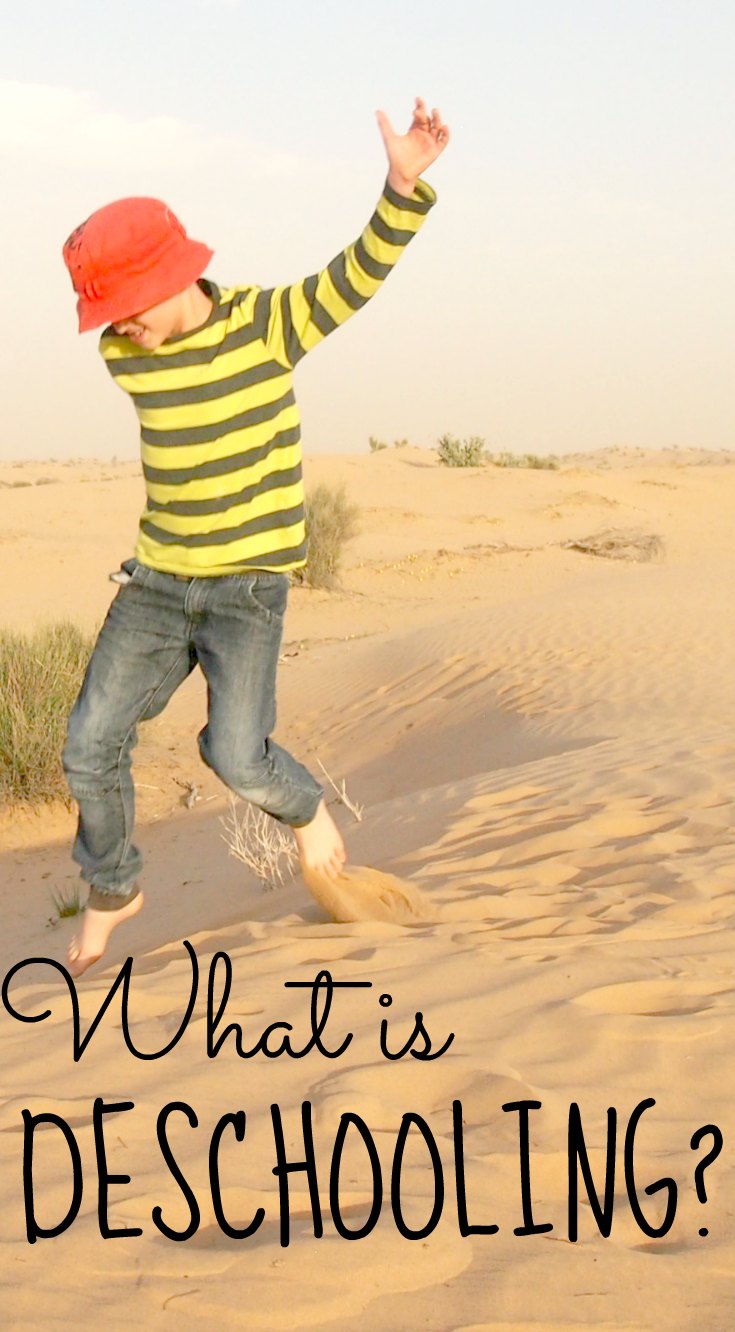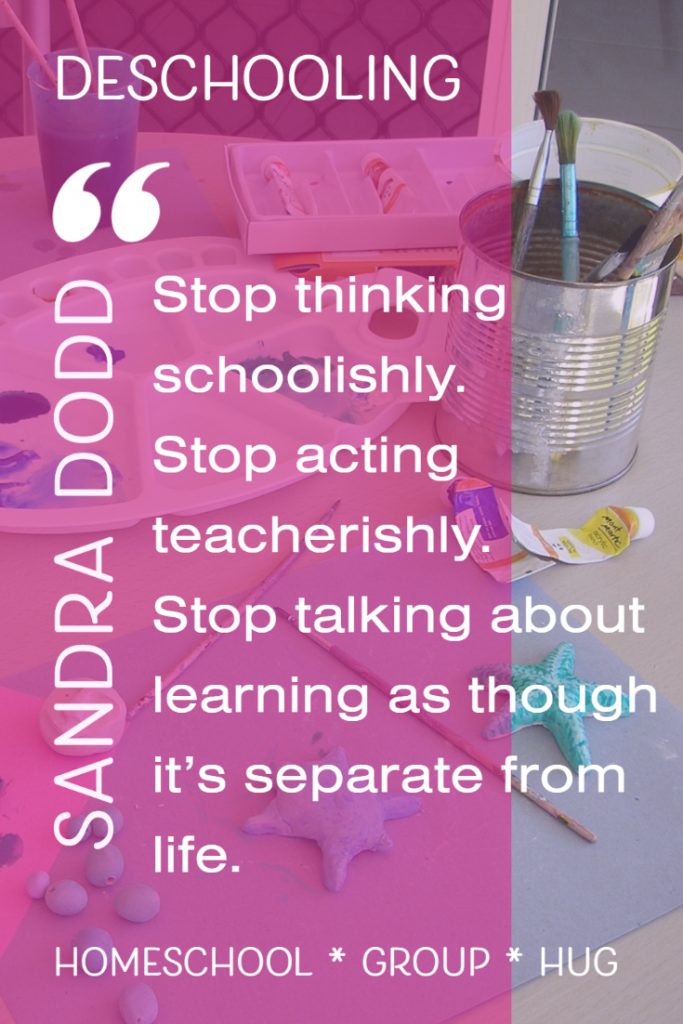Deschooling is a term you’ll often hear in homeschooling, unschooling, or worldschooling circles. It’s a common term, but one you need to grasp before moving forward with a homeschooling career.
Both the parent and the child have to be deschooled. Some give ratios and schedules, one month of deschooling for every year the child was in school. For adults, the parents, obviously we can’t do that, here deschooling means forgetting what a massively school-influenced society has taught us to believe education must look like.
There is no set deschooling period in this instance, deschooling comes through a change in thinking. That change will accelerate once the parent sees how their child will really learn.
It’s quite likely that most home educating parents have at least started their deschooling process before they consider, and then plunge into, a homeschooling lifestyle. The shift is just not possible without at least starting the de-schooling though-shift.
This pin is for you to save to Pinterest, thanks for helping!

Table of Contents
Deschooling
The concept of deschooling can be a hard one to grasp. For kids formerly enrolled in traditional school and beginning a homeschool education, it is the process of getting over or forgetting how school life was. For adults, deschooling means forgetting what our own school education and traditional school society taught us to think education looked like.
But deschooling means different things to different people, as you can see from our deschooling quotes at the bottom of the page. There seems not to be a set definition of deschooling although Ivan Illich first popularised the term deschooling in his 1971 book.
Deschooling for Adults
For adults, we need to put ideas like those below out of our heads to become deschooled.
- That the school environment and methods provide the best possible education
- That children’s learning happens to a schedule
- That learning only happens through teaching
- That kids are best kept in same-age packs
- That education must be covered in neat blocks, by subject
- That repetition, worksheets and rote learning are the way to go
- That kids cannot socially interact outside their age range
I’m sure you can think of many other ideas and thought processes that need to be deschooled out of the typical grown-up product of the education machine. It’s not uncommon for close friends and family to need a good degree of deschooling before they can get behind your new educational model too. That can be hard to engineer!
What is Deschooling for Kids?
Deschooling here refers to the mental changes a student goes through after removal from school or another institute of learning. The school mindset must be lost over time and the child must adapt to a new environment with far less regulation and structure. It is a period of adjustment.
Some kids may pine for school mates, some may find they can’t occupy their time without being told what to do, others may be concerned about identifying as homeschoolers and attending homeschool events.
It will come good with time, as I said above, the longer they’ve been in school, the longer this process can take.
What to Do in the Child’s Deschooling Period
Don’t try and do school at home. Let the child rest and decompress but at the same time make life outside of school fun and enjoyable.
Take long walks, really talk, get that parent-child bond as strong as it can be. Take educational trips or take part in activities, just stay away from the worksheets and work books.
Stay fit, active and healthy, don’t veg out on the couch, but do find vaguely educational TV shows or movies.
Take them to places where they can hang out with other kids. Your child may be rejected by former class mates so be watchful of that in parks and playgrounds. Take first steps in joining your local homeschooling community, nothing too heavy, look out for informal play meet-ups on neutral territory.
Some quotes on deschooling from well-established home educators
Use the Pinterest buttons at the top of the page to save this deschooling quote to Pinterest. Thanks.

To me, deschooling can be the process of getting over expectations as induced by school upbringing and society by conventional rule-followers who do things the right and only way and think any deviation from the expected is weird and doomed to failure. But those “normals” went to school and know nothing different so maybe all of society’s expectations have their basis in government approved education. We need to move on past that roadblock.
I asked around and got a few quotes on what is deschooling from other members of the living differently community.
What is deschooling?
“Deschooling reconnects a person to their unique set of gifts, quirks, passions, and interests and puts them in control of becoming a whole person .” Tanya, Washington DC
“Deschooling is the term used to reconnect with an individual’s natural biorhythms and cycles. It is about deprogramming yourself from the system and reconnecting to your inner truth.” Anabel, Australia
“Deschooling to me is rethinking what it means to learn. It’s thinking more broadly about skills development and knowledge needed to live a fulfilled life. If you extend that concept, it’s not accepting the status quo of jumping on the consumer treadmill and thinking outside the square of how to live your life.” Ingrid, Australia, blogs at Defying Gravity
“Stepping away from the confines of society and what they expect of us – that means not doing exams, confined curriculum, or going down paths that are the norm UNLESS it’s what we want to do.” Kirsty, UK, blogs at, Barts Go Adventuring
“Deschooling to me would be to unravel ANY negative experiences from the past that have not served us positively and work towards healing, forgiving then re-experiencing things in a different way that works for US and us alone, so that we don’t write things off entirely, so that we continue to learn things without holding onto baggage that creates learning blockages, so we are uninhibited by other people’s opinions and can make learning fun for ourselves.” Kym, Australia
“Deschooling is rethinking what learning is and how it happens, unravelling the mess that people indoctrinated by school shoved into our heads as children.” Beverley Paine, Australia blogs at The Educating Parent
“Divesting oneself of the cultural clutter that shrouds our instincts and the truth that we already know.” Mhairi, London
So, deschooling means different things to different people. If you’re a totally school-at-home homeschooler (I’ve never met one but they do exist, somebody must be buying all those boxed curriculums!) the term probably isn’t important to you.
The further along the scale you are towards radical unschooling, the bigger the deschooling shift must be. I don’t like to put alternate educators in boxes, all kinds of homeschoolers are welcome here. We all share a goal, after all, to raise happy, healthy, well-educated kids who function well in the world when they leave our protection. Good on you for that!
Sign up to follow, it’s free and easy to un-subscribe! Or read why school is a terrible place to get an education!
Leave a Reply